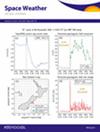Modeling Geomagnetically Induced Currents in the Alberta Power Network: Comparison and Validation Using Hall Probe Measurements During a Magnetic Storm
IF 3.7
2区 地球科学
引用次数: 0
Abstract
During space weather events, geomagnetic disturbances (GMDs) induce geoelectric fields which drive geomagnetically induced currents (GICs) through electrically-grounded power transmission lines. Alberta, Canada—located near the auroral zone and thus prone to large GMDs—has a dense network of magnetometer stations and surface impedance measurements to better characterize the GMD and ground conductivity, respectively. GIC monitoring devices were recently installed at five substation transformer neutrals, providing a unique opportunity to compare data to modeled GICs. GICs are modeled across the >240 kV provincial power transmission network during a moderate GMD event on 24 April 2023. GIC monitoring devices measured larger neutral-to-ground currents than expected up to 117 Amps during peak storm time, providing unequivocal evidence linking network GICs with GMDs. The model performs reasonably well (correlation coefficients >0.5; performance parameter >0.15) at four of five substations, but generally underestimates peak GIC values (sometimes by a factor >2), suggesting that the present model underrepresents overall network risk. The model performs poorly at one of the five substations (correlation = 0.46; performance parameter = 0.10), the reasons for which may be due to simplifications and/or unknowns in network parameters. Despite these underestimates, during this GMD, the model predicts the largest GIC at substations located in the northeastern part of the province (240 kV) or around Edmonton (500 kV)—regions which have significant electrical and industrial infrastructure. Further refinement of the network model with transformer resistances, more line and earthing resistances, and/or including lower voltage levels is necessary to improve data fit.阿尔伯塔省电力网地磁诱导电流建模:利用磁暴期间的霍尔探头测量进行比较和验证
在空间天气事件期间,地磁扰动(GMDs)会诱发地电场,从而驱动地磁感应电流(GICs)通过电气接地的输电线路。加拿大艾伯塔省位于极光带附近,因此容易发生大规模地磁扰动,该省拥有密集的磁强计站和地表阻抗测量网络,分别用于更好地描述地磁扰动和地电导率。最近在五个变电站变压器中性点安装了 GIC 监测装置,为将数据与建模的 GIC 进行比较提供了独特的机会。在 2023 年 4 月 24 日的中度 GMD 事件中,整个 240 千伏省级输电网络的 GIC 被模拟出来。在风暴高峰期,GIC 监测设备测得的中性点对地电流大于预期,最高达 117 安培,为网络 GIC 与 GMD 之间的联系提供了明确证据。该模型在五个变电站中的四个表现尚可(相关系数为 0.5;性能参数为 0.15),但普遍低估了 GIC 峰值(有时低估了 2 倍),这表明目前的模型未能充分反映整体网络风险。该模型在五个变电站中的一个表现不佳(相关性 = 0.46;性能参数 = 0.10),其原因可能是网络参数的简化和/或未知。尽管存在这些低估,但在本次全球移动数据期间,该模型预测了位于该省东北部(240 千伏)或埃德蒙顿(500 千伏)附近的变电站的最大 GIC - 这些地区拥有大量的电力和工业基础设施。有必要通过变压器电阻、更多的线路电阻和接地电阻以及/或包括更低的电压等级来进一步完善网络模型,以提高数据拟合度。
本文章由计算机程序翻译,如有差异,请以英文原文为准。
求助全文
约1分钟内获得全文
求助全文

 求助内容:
求助内容: 应助结果提醒方式:
应助结果提醒方式:


